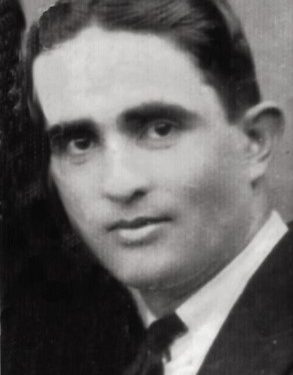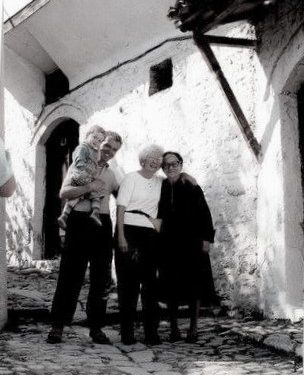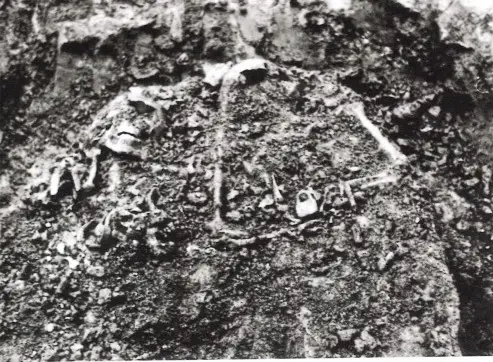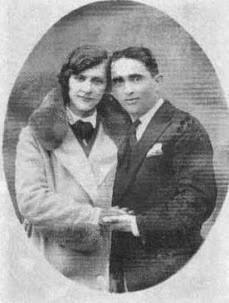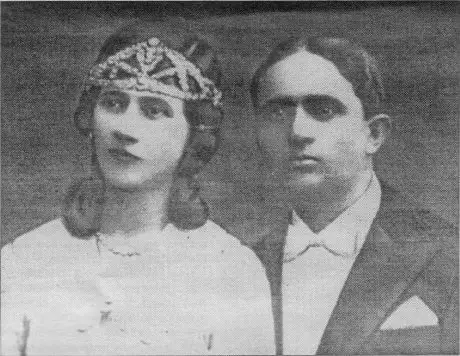By Adela Kolea
-Interview with Mrs. Elda Stefa (Naraçi), who lives in Trieste, Italy. the daughter of Kostaq Stefa-
Memorie.al / It was November 8, 1943. An American C-53 transport plane, with 30 Americans on board, including 13 doctors, 13 nurses and 4 crew members, was leaving Catania, Sicily, Italy to to Bari, to help some wounded American soldiers. Due to difficult atmospheric conditions and pursuit by German “Messerschmitt” planes, the American plane is forced to make an emergency landing in a lost place in Albania. The crew had no idea where they were sitting, due to the breakdown of their plane’s internal compass. The place was called Belsh, Elbasan. After several days of walking, accompanied by a group of partisan couriers, led by Hasan Gina, a former student of Kostaq Stefa, they arrive in Berat, where they will be distributed among the respective shelters that were planned for them in several families. Kostaq Stefa from Berat was the person who would accompany them, and who would later be their translator, as he knew the English language very well and at the same time, he was the one in whose house two of the American nurses would stay.
Kostaqi had completed his studies in Tirana at the Albanian-American Technical Institute, (which would later be called “Harry Fultz”) in 1926, where he excelled and was assigned there as a professor. Then he won a scholarship to Florence.
The American nurses, Agnes Jensen Mangerich and Vilma Lytlle, found themselves very relieved and safe in Kostaq’s house, helped and supported by Kostaq’s wife, Mrs. Eleni Stefa. They managed to communicate in English, which in that period was a rare thing for Albanians. This was an intellectual Berat family.
Kostaqi had studied in England and Florence and his wife, Eleni, was one of the first five girls from Berata who attended the “Normal” School in Korça and became a teacher. Eleni was a teacher in the elementary school of Berat. She, for her part, spoke a minimal level of English but got along well with the American nurses. And this thing, especially as a woman, facilitated their communication and made it possible for Eleni to come to their aid for any personal need. On January 9, 1944, after 63 days of vicissitudes, being protected from the Germans, most of the doctors, nurses and members of the plane’s crew, through the cooperation of the American-British services, managed to meet the southern coast of Italy. There were only three nurses who, after a further shelter in Berat, managed to cross from the Albanian coast to Italy in March. Kostaqi, always, their undivided and trusted companion. He accompanied them to the Karaburun peninsula.
On September 8, 1947, at the door of the house of the Berata translator, Kostaq Stefa, who sheltered the two nurses and helped their whole group, some soldiers arrive, who communicate the arrest order to him! Kostaqi is arrested under the pretext of the farcical accusation that he was an “agent of the Americans”. That period coincided, among other things, with the arrests of other technicians of Fultz’s American school. The ordeal of his family begins: his wife and five children. The pretext: cooperation with the Americans who, from being allies, had meanwhile turned into enemies of the Albanian state. On the morning of March 3, 1948, Kostaqi, together with three other people, was put in front of the execution squad and shot. Kostaqi was executed in 1948 together with three other compatriots. He, whom the partisans themselves had tasked as a translator, companion and host for the Americans during the war and who bore the “guilt”, that he had studied and worked with the American technicians at Fultzi’s Technical Institute in Tirana, in that school where he had had as his student, Mehmet Shehu himself, the number two of the Albanian communist nomenclature of the time, was shot by the Albanian communists.
Hello Ms. Elda! I wish you a warm welcome to ALBANIA NEWS.
– I’m glad to find you, even, you’re welcome to come to me.
– This topic we are going to discuss is a painful argument for you. But, at the same time, I think that, for people like your father, the best way to remember them and appreciate them properly, consists precisely in the fact that they are talked about, written about, discussed.
No doubt. My father was born into a family of patriots, he was the grandson of Kostandin Kristoforidih, also the grandson of Gjergj Stefa, representative of Berat in the League of Prizren. Other patriots have also emerged from the bosom of his family. The father himself was a prominent intellectual for the time. He had studied at the Albanian-American Technical Institute in Tirana, which would later be named after Harry Fultz. He had been in London where he had received the proper preparation with the group of boy scouts, sent by his school. The classification as Masterscout had been handed over to Sir Robert Smyth Baden-Powell himself and further, he had been to study in Florence, Italy. He knew English as well as Albanian. Italian as well. In Berat, the father worked in the education section, helped the Red Cross, was a well-known activist, helped the Chams a lot when they had their respective difficulties, which history knows about. In fact, we had partisans in the family. My only uncle was a partisan, my mother’s three brothers were partisans. From those partisans, who believed in a high cause, in high ideals…!
– There were 5 children in your family, brothers and sisters. You yourself, the date of birth 1939. That is, almost 9 years old at the tragic moment, that of the shooting of the father. How did your mother enable you to somehow overcome the absence of your father and at what age did you become aware of the true way he left your life? I think it was your mother who told you everything about your father’s activities and more precisely, from the episode that determined the unjust and macabre end of his life…?!
Yes, I was little. At first, I did not understand what had happened. This is also because, in order to avoid trauma, the mother was very delicate and careful with us children. Only our older brother, Alfred, who was 13 at the time and very smart and mature, understood everything. He was very close to his mother. I didn’t understand much at first because I grew up with my aunt in Durrës, but Vangjushi and Tina, who stayed in Berat, found it more difficult.
It was Alfred, then a teenager – born in 1934 – who was sent to the inquest by his mother that day, March 3 to be exact. The mother was informed on March 2nd that the father’s life had been spared, and this news was communicated to her directly, because on March 2nd, a short 4-minute meeting with the father was fixed at the investigator. So much so that he himself told her: “Do you see, woman, that we should have faith in justice? Because I’m going to be sent to Burrell prison, bring me some clean clothes, a coat, etc…”! When they took off his handcuffs for those few minutes of meeting, his hands were bloody…!
The mother gets permission from Alfred’s teacher that lesson at school, for the boy, to send him to the investigator, and she herself continued the lesson with her class.
Alfredi takes some pastries that his mother gives him, to send to the police about this fact, because this was a relief for us: “Father was spared life, they would not sentence him to death…! They would transfer him to the Burrel prison”! When Alfredi arrives at the investigator’s office, the policemen throw pastes in his face and say: “Go away, because your father was shot last night”! He returns to his mother crying; the mother was at school with her students and she couldn’t believe her ears. She returned to the investigator herself, where they confirmed the macabre news, and told her: “Now, say Long Live the Party”!
The father had been shot, entering March 3, at 2 o’clock in the night…!
Further, according to our mother’s orders, when relatives came to our house for comfort, precisely so as not to make us sad or scared, we children were removed from the house, taken to neighbors or elsewhere, so that we would not hear the cries. When father died at the age of 42, we were small. The younger sister Tina, on the same day that her father was shot, turned one year old! Tina has never celebrated her birthday! For the first time, she celebrated her birthday, only with the advent of democracy. But, of course, growing up, I learned many things by myself, even those things that maybe my mother didn’t express to us openly, so that one day, after an emotional outburst, I said to her: “Mom, don’t get tired, you’d better tell us that the date cursed March 3, made a bomb drop in our family…”! She looked at me with compassion.
However, I must say, that our mother in the presence of us, i.e., her children, never insulted the rulers or Enver. He didn’t want to cause us pain upon pain, he didn’t want to add to the hatred we had and the sadness we carried. Mom wore black at the age of 34 and put a black scarf on her head. When the school principal saw her, she said: “You can’t come to school with this scarf on your head, or take it off, or you’ll be fired”! Mom did not take the scarf off her head and was fired. We were at the mercy of fate. Mom was very skilled in her profession as a teacher. It took the next Party Congress to finish and mother to be rehabilitated, to start work after a few months, that is, she was unemployed from March to November.
– What happened to your father is also the disappointment of many former partisans, who believed in a definite, just cause and did not want the installation of a dictatorship, it was not that, the form of government they wanted for Albania, it was not the reason for which their friends had given their lives…! Is that so?
Exactly like that. Many honest partisans and their families, many of those elements, who were part of the so-called “Defense” institution, which would later be called “State Security”, who were followers of an ideal in which they believed, would be disappointed by such similar episodes. We might have had our relatives in their ranks, but even they themselves had already entered into their very cores of fear, and could not reason with complete independence, except to express themselves in such expressions as: “It is not for us to let’s judge, only the Party knows these things…”!
– I know that you also received letters of thanks in your family from the Americans saved by your father. In which year did the first letters start arriving and what was the feeling you had in the family, regarding this?
Agnes, one of the American nurses of that operation, the one who took shelter in our house then, was the first to come to Albania with democracy. It was October 1995 and she herself, at the age of 75. He went immediately and with a mixture of feelings: longing, emotions, sadness, directly to Belsh, Elbasan, to the place where his plane had landed in 1943. Everything that had happened in those days went over painfully in her memory. From there, he insisted on going to the house of the Stefa family in Berat, to the family that sheltered him, to the family of the translator Kostaq, that is, to our house!
He came to our house with unprecedented love and longing. He met our mother with a lot of love and longing, he thanked us endlessly. He remembered the time when he took shelter in that house during the War, and when he said to our mother: “Oh, we are finally sleeping in a real bed, after the vicissitudes of the long road through the mountains”!
He also remembered when one of their colleagues, from the wounds he had received on his feet from damaged shoes from the long walk of many miles covered on foot, to reach from Belshi to Berat, Kostaqi had also repaired his shoes, as his feet him, who were treating him as best they could, they were in danger of becoming gangrenous…! At one point, we heard him say to our mother: “Where did they find him, how did the Germans find Kostaq? Those who then killed him…”! “Ah, no Agnes, – our mother told her – Kostaq was not killed by the Germans, but by the Albanian communists!” She remained frozen, stunned. With our mother, Agnes created a warm and continuous relationship over the years. They both maintained regular correspondence.
In fact, when in 1997, our families arrived in Italy, Trieste, and we requested political asylum, Agnes, from America, as soon as she became aware of this fact, did her best through the American Embassy in Rome, to speed up the practice of political asylum for us and to accept the request immediately. And in fact, that’s what happened. Therefore, after Agnes came to us and, after her promise that as soon as she went to the USA, she would do her best to contact her other former colleagues, participants of that operation, and inform them those she herself had connected with us, she had come to meet us personally in Albania, our family also started contacts with the other American doctors of that operation. They started writing us letters of thanks, which we keep today with love, in our family archive, some copies of which we are attaching to you for this interview.
– We know that the American media wrote at the end of January this year about the death of Harold Hayes, the American military doctor, the last survivor of this odyssey in Albania during the Second World War. How interested was the American state in this matter and in your family when you were still in Albania?
When we were in Albania, the American state was interested in us through its accredited diplomatic representation in Albania and, more precisely, through its ambassadors.
Ambassador William E. Ryerson was the one who, in ’93, participated in the grand ceremony that was held for our father in Berat – when his remains were found, for his dignified burial in the cemetery of the Martyrs of Berat. In that ceremony, all of Berat honored us, regardless of political or religious distinction. Ambassador Ryerson, who was then also present at the lunch that is served for the dead according to our tradition, which our family prepared, as if our father had died that day, and not so many years ago…!
After some time, an ugly event took place with the protagonists of some fanatics, who caused damage to our father’s grave.
The next American ambassador to Albania, Mrs. Marisa Lino, was made aware of this. She was personally interested in having her father’s grave repaired and made new, saying: “To make a decent and new grave for him, as a respected and honorable man who rests in the Martyrs’ Cemetery deserves”! When Ambassador Arvizu was appointed to the American embassy in Albania, we had already moved to Italy, to Trieste. But, since at the initiative of the Mayor of Berat then, Mr. Fadil Nasufi was a grand ceremony, during which a street in Berat was named after our father, then we went to Albania from Trieste especially for this event.
After that, Ambassador Arvizu came to our house several times, with great interest, love and respect for our case.
Together with our mother and all of us, we described memories of that time, and I even had a small exhibition of old photos of my father, in the premises of the house itself. He observed every corner of the house with interest. Because he wanted to see with his own eyes, every inch of that house that sheltered American nurses during the War. His father’s activities, reflected in the old photos of our family archive, he not only followed with great interest, but was stunned when he saw our father, Kostaq, with Mehmet Shehu in a photo, he was speechless when found out that he had been a student of his father and that Mehmeti himself had attended the American technical school.
Ambassador Arvizu insisted that a documentary be made on this story and the documentary was shown in the presence of us, the family members of Hasan Gina, the courier who accompanied the Americans, Ambassador Arvizu himself and many of our friends and relatives. On the other hand, as an American citizen and as an implicated person and protagonist of the event, Agnes, the American nurse, has written a book on this story.
Two other books were written later by the Americans. These, in addition to the book written by our family. But I regret to say that the book written by Cate Lineberry has neither the quality nor the accuracy or authenticity of events compared to Agnes’ real book.
Even the American journalist who recently wrote in ‘The New York Times’ about the news of the death of the last American doctor of that mission in Albania, Harold Hayes, does not have the correct accuracy in his writing, as he is based on Cate Lineberry’s book, not in that of Agnes Jensen Mangerich, which is more coherent to the Albanian reality of that relevant time, to the Albanian generosity, to the fact that the Albanians shared corn bread and cheese with them, i.e. that is, to the exaltation of Albanian generosity, as a feature that truly characterizes us. We take this opportunity to extend our sincerest condolences to the family of Harold Hayes on his loss.
– How much has the Albanian state taken care of this issue, how much importance and due respect has been given to it?
The father, in the Berisha government, was given the title “Martyr of Democracy”. His remains rest in the Martyrs’ Cemetery of Berat. They took care to make him a decent grave. Our Berat has respected us a lot. Berat has been close to us and appreciated us as a family, for our bitter past and at the same time, for the merits of our family and our father in particular. In Berat, a street is named after our father.
– Your mother, the honorable lady, ‘Teacher of the People’, Eleni Stefa, has written a book on the memory of her husband, your father. She, an Albanian intellectual woman, former teacher, one of the first teachers in Berat, with a high ability to narrate and write, would have deserved to narrate a different life. How did she experience the period when she was preparing the book…?
It was, of course, excited the whole time. But she was happy when the book ended. After noticing the cover that was prepared for the book, he was sad and said: “Eh, you Kostaq, how lucky you were…”! There were moments when she read the book by herself with glasses, considering her old age, and when she got tired, I continued reading. She passed away at the age of 102. But when he turned 100 years old, in Trieste, a big celebration was organized by the Municipality, as is customary in Italy to respect 100-year-olds. And this made him immensely happy.
– Did your mother Eleni know Enver Hoxha personally?
Yes, he knew him. He knew him in his youth, in Korça. She attended the “Normal” School, after which she became a teacher. While Enveri was also studying in Korça, at Lice. The school that my mother attended was, of course, only female, but in short, they were students in the same period, in the same city, and attended common facilities. They were known for this. In fact, I know that my parents met Enver Hoxha by chance in a hotel in Bari, Italy, around 1939. My mother and father went to that city and met Enver who, in the same hotel, had gone to meet his sister with her husband, Bahri Omari. How did his sister know, where her husband would end up…!
– In your opinion, “how much” and “how” does the Albanian people know its history?
Oh, partially and distortedly, not the reality….!
– In what way do you think you resemble your father, Mrs. Elda?
I say that I mostly resemble him – just as he was passionate about foreign languages – in the passion that I also have for these languages. I have learned Russian very well and have worked over the years as a translator for Russian, both in Albania and in Italy. I know English, Italian. These studies, self-taught on my part, taking into account the time and my age. Also, the passion for literature. I have read the great Russian authors, which for my time, was considered not only a real passion, but also a privilege to find the materials you were looking for for reading, since they were missing. Memorie.al




